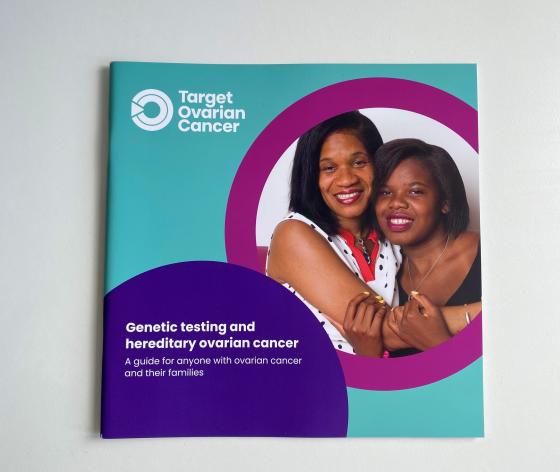If you’ve recently been diagnosed with advanced high grade ovarian, fallopian tube or primary peritoneal cancer (stage 3 or 4), alongside testing for gene variants you should be offered testing for homologous recombination deficiency (HRD).
This is now available in England, Wales, Scotland and Northern Ireland. Speak to your oncologist to see if this is an option for you.
Watch our Ask the Experts session about HRD and genetics, led by Dr Alexandra Murray, Consultant Clinical Geneticist and Clinical Director at the University Hospital of Wales.
What is homologous recombination deficiency (HRD)?
Our DNA (a molecule in our cells that contains our genetic code and tells the cells how to work and behave) is constantly being damaged and repairing itself. This repair process is called homologous recombination. When our body is unable to repair breaks in DNA this is called homologous recombination deficiency (HRD). It means that, in those with a diagnosis of ovarian cancer and whose tumour tests positive for HRD, cancer cells have a harder time repairing themselves.
Until recently it was thought that HRD was caused mostly by BRCA1 or BRCA2 gene variants. It's now understood that HRD can include a number of genes. It's been found that around half of women with advanced high grade serous ovarian cancer have HRD.
What does the HRD test involve?
A sample of your tumour is needed to test for HRD. This can be taken during surgery for ovarian cancer or through a biopsy. A biopsy involves taking a small sample of body (tumour) tissue so it can be examined under a microscope.
This type of testing is called somatic testing. It only picks up variants that are present within the tumour. It doesn’t pick up if variants are present in the germline cells (changes in cells that are inherited from parents and are present in all cells of the body) too. Some people may have a variant present only in the tumour, while others may have it present both in the tumour and germline cells. So a test for a germline variant should be done separately.
What does it mean if my tumour tests positive for HRD?
If your tumour tests positive for HRD certain treatments are more likely to be effective. This includes PARP inhibitors. These are a type of targeted therapy that block the action of the PARP enzyme in cancer cells, which means they can’t repair certain types of DNA damage. Being HRD positive means cancer cells have a harder time repairing themselves. PARP inhibitors further block this repair mechanism causing more cancer cells to die.
More about targeted treatments for ovarian cancer
Last reviewed: November 2022
To learn more about our review process, take a look at our information standards.



